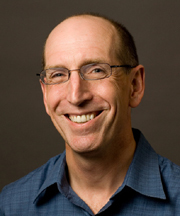
Whether stirring troops to battle or appealing for peace, the power of persuasive speech has played a pivotal role in armed conflicts throughout history.
Analyzing speeches by figures ranging from Pericles to Winston Churchill to Osama Bin Laden helps students in Associate English Professor John Duffy’s Rhetoric of War and Peace seminar learn how to become better orators themselves.
“My class was about the study of rhetoric, but I also wanted my students to practice rhetoric,” says Duffy, Joseph Moran Director of the College Seminar and Francis O’Malley Directory of the University Writing Program at Notre Dame. “So rather than take a final exam, they had to give a speech in the Great Hall of O’Shaughnessy. Our goal was to give such good speeches that people walking through on their way to class would stop, pause, and listen to the speech for a little while.”
Held in December 2010, Domers’ Corner: A Celebration of Speech and Speechmaking allowed students to demonstrate the verbal communication skills the College Seminar (CSEM) seeks to develop.
A required course for all College of Arts and Letters majors, CSEM introduces students to significant questions in the liberal arts while emphasizing small group discussion and oral presentation. Students can choose from more than a dozen different seminar topics each semester.
In Duffy’s war and peace course, students explore the rhetorical tools and tropes leaders use to prevent or instigate armed conflict.
“War is essentially irrational from the perspective of one’s own safety,” Duffy says. “To expose oneself to spears, bullets, chemical weapons—this is not something that we would normally do, and yet, historically, we do it again and again. Our class looked the types of rhetoric that move people to abandon their sense of self-preservation and fight for what in some ways is an abstraction—freedom, or the nation.”
For Domers’ Corner, students worked in groups to draft speeches but then presented them individually. While most students spoke in the Great Hall, some gave their speeches in Reckers cafe. Topics ranged from the influence of WikiLeaks to the war on narcotics to other, less serious subject matters. “One student gave a satirical speech that our next war had to be against Canada,” Duffy says.
For his part, sophomore Arabic and peace studies major Sam Mitchell spoke about the role of media in war. “My speech’s thesis revolved around critiquing multinational media corporations and their ability to propagate violence and war in order to sell the news,” Mitchell says.
Although students regularly gave short speeches in class, Mitchell says giving an address in a busy campus forum was intimidating. “I wasn’t too thrilled,” he says. “I don’t count myself among those who have stage fright, but public speaking really wasn’t my forte.”
Mitchell says voluntary practice sessions with classmates helped build confidence and offered valuable critiques as he polished his final speech. “I found myself incorporating more than a lot of the ideas my peers and Professor Duffy offered me,” he says. “It was a great learning experience, one that I feel was beneficial to us all.”
Duffy says he believes the event was a success because it gave his students an opportunity to harness the rhetorical resources they developed in the classroom and pushed them to overcome a common fear—public speaking.
“Some of them tell me it was the best thing that they did, giving that speech in the Great Hall,” he says. “They don’t get that opportunity much in their other courses. It’s a unique experience for them.”
Rhetoric of War and Peace will be offered again, and Duffy says he hopes to incorporate Domers’ Corner into other CSEM courses in the future.
Learn More >


